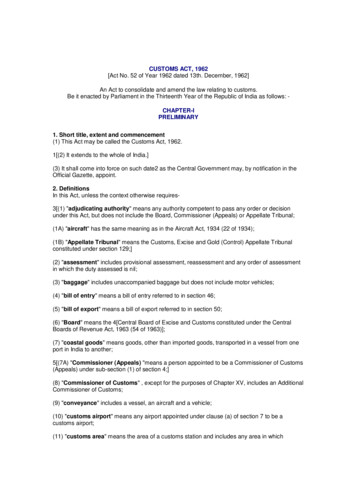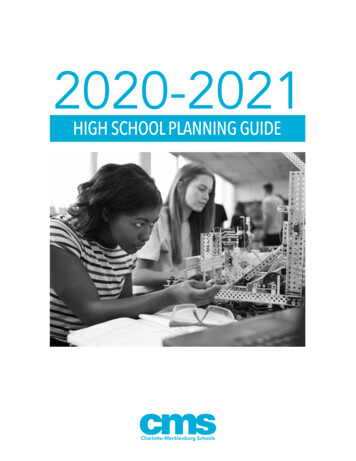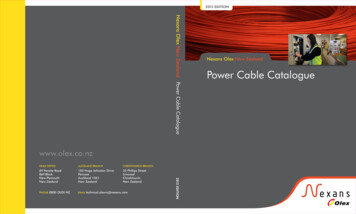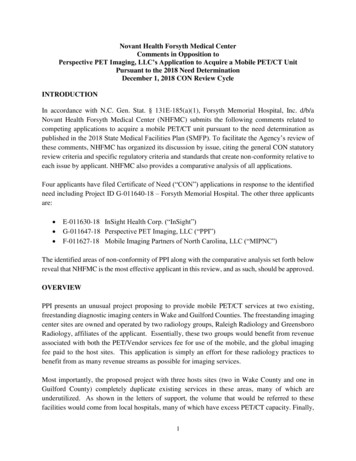![Mecklenburg College Annual Catalogue [1962-1963]](/img/32/mecklenburgcolle148carv.jpg)
Transcription
MECKLENBURGCOLLEGEANNUAL CATALOGUECHARLOTTE 8, NORTH CAROLINA
MECKLENBURGCOLLEGEA Two-year Junior College, under the Charlotte Com munity College System, offering courses in the ation, and Community EducationMember ofThe North Carolina College ConferenceAssociation of Collegiate Deans and RegistrarsAmerican Association of Junior CollegesAmerican Association of Higher EducationSouthern Association of Junior CollegesAccredited byThe North Carolina State Department of Education
TABLE OF CONTENTSTABLE OF CONTENTSCALENDAR OF EVENTS5-6BOARD OF TRUSTEES 6ADMINISTRATIVE STAFF 7CALENDAR7INSTRUCTIONAL STAFF 8COMMITTEES OF THE FACULTY 9-10GENERAL INFORMATIONObjectives 11Degrees 11History 12-13Location 13Accreditation and Affiliation 14Student Personnel Service and Guidance 14Counseling and GuidanceThe Library 14Veterans’ Education 15Vocational Rehabilitation Services 16Employment Service 16STUDENT ACTIVITIESStudent Government 16Dramatics 17Newspaper17College Yearbook — The Echo 17Athletics17Recreation17Honor Society172
TABLE OF CONTENTS — ContinuedGENERAL REGULATIONSAdmission Requirements 18Admission by Certificate of Graduation 18Admission by Examination 19Admission by Special Examination 19Admission as a Special Student 19Admission as Unclassifed Student 19Admission as a Transfer Student 19Admission as an Auditor 20Foreign Students 20Program Planning 20Graduation Requirements 20Adding and Dropping Courses 21Attendance 21OTHER REGULATIONS ARE AS FOLLOWSTransfer of College Credits 21Classification of Students 21Schedule of Classes 22Withdrawal 22Conduct 22Number System 22Housing Facilities 22Honor Roll 22Grading System 23Academic Standing 23Graduation Scholastic Honors 24SCHOLARSHIPS24National Defense Student Loan Program25EXPENSES 26Total Expenses For Residents ofNorth Carolina 27oo
TABLE OF CONTENTS - ContinuedPROGRAMS OF STUDY28Liberal Arts (University Parallel) -29Elementary Education (University Parallel)-30Pre-Medicine (University Parallel) -31Department of Business-32Proficiency Tests -32Business Education (University Parallel) -33Business Administration (University Parallel)-34Secretarial Science (University Parallel)-35Clerical Two-Year (Terminal) 36Adult Education—37Course Offerings 37COURSE DESCRIPTIONSArt 37Business 38Secretarial Science 39-40Education and Psychology-40-41English 41-42Foreign Languages 42French 42Spanish 42Humanities 43Mathematics 43-44Music 44Physical Education . 44-45Religious Education 45Science 45Biology 45-46Chemistry 46Physics 47Social Sciences 47-48DEGREES GRANTED 48ROSTER OF STUDENTS 49-53STUDENTENROLLMENT54SUMMARY OF GRADUATES 544
CALENDAR OF EVENTS1962- 1963Fall Semester, 1962September 4-7 Pre-registrationSeptember 10 Registration of Returning Students WhoHave Pre-registered and Paid Registration FeeSeptember 10, 11, 13 Orientation of New StudentsSeptember 12 Registration of New Students Who HavePre-registered and Paid Registration FeeSeptember 14 Registration of Students Who Have NotPre-registered and Paid Registration FeePrior to September 8September 17 First Day of ClassesSeptember 24 Last Day to Add Courses for CreditOctober 8 Last Day to Drop Courses Without PenaltyNovember 20 Last Day of Classes beforeThanksgiving HolidaysNovember 26 Classes ResumeDecember 21 Last Day of Classes beforeChristmas HolidaysJanuary 2, 1963 Classes ResumeJanuary 18 Last Day of ClassesJanuary 21-25 Final ExaminationsSpring Semester, 1963January 24-25 Orientation of New Students andPre-registration of Old StudentsJanuary 28 Registration of Returning Students WhoHave Pre-registered and PaidRegistration FeeJanuary 29 Registration of New and Other StudentsWho Have Not Pre-registered andPaid Registration Fee Prior to January 26January 30 First Day of ClassesFebruary 6 Last Day to Add Courses for CreditFebruary 20 Last Day to Drop Courses Without PenaltyApril 12 Last Day of Classes Before Spring HolidaysApril 22Classes ResumeMay 21 Last Day of ClassesMay 23-29 Final ExaminationsJune 2 Graduation Exercises5
SUMMER SESSION, 1963First TermRegistrationJune 6June 7First Day of ClassesJuly 4HolidayJuly 12Last Day of ClassesJuly 15-16FinalExaminationsSecond TermJuly 22 RegistrationJuly 23-First Day of ClassesAugust 26-Last Day of ClassesAugust 27-28-Final ExaminationsBOARD OF TRUSTEESJ. Murrey Atkins, ChairmanDr. Ernest A. BeatyC. A. McKnightThomas M. BelkAddison R. ReeseJohn J. DeLaneyOliver R. RoweLinn D. GaribaldiSheldon P. SmithDr. Elmer H. Garinger,Robert L. TaylorSecretaryDr. Thomas Watkins, Sr.John Paul Lucas6
Administrative StaffDirectorJames F. AlexanderKenneth H. Diamond, Jr Registv&vMrs. Dorothy R. Crawford LibravianCALENDAR 1962-1963SEPTEMBEROCTOBERNOVEMBERS142736859 10 1 1 12 13 14 1516 17 18 19 20 21 2223 24 25 26 27 28 2930M T W T FS24136578 9 10 1 1 12 1314 15 16 17 18 19 2021 22 23 24 25 26 2728 29 30 31T FS12 34 56 78 9 101 1 12 13 14 15 16 1718 19 20 21 22 23 2425 26 27 28 29 30DECEMBERJANUARYFEBRUARYsMMTWTTFFS184 572639 10 1 1 12 13 14 1516 17 18 19 20 21 2223 24 25 26 27 28 2930 31STWST187613 14 1520 21 2227 28 29SMW29162330T FS4 5310 1 1 1217 18 1924 25 2631SMMTFS124936 78510 1 1 12 13 14 15 1617 1C 19 20 21 22 2324 25 26 27 28STWWTMARCHAPRILMAYFS219846 73510 1 1 12 13 14 15 1617 18 19 20 21 22 2324 25 26 27 28 29 3031M T W T FS42613578 9 10 1 1 12 1314 15 16 17 18 19 2021 22 23 24 25 26 2728 29 30W T FS42139 10 1 186 7512 13 14 15 16 17 1819 20 21 22 23 24 2526 27 28 29 30 31JUNEJULYAUGUSTM T W T FS4623519 10 1 1 12 137814 15 16 17 18 19 2021 22 23 24 25 26 2728 29 30 31T FS2319 107864 51 1 12 13 14 15 16 1718 19 20 21 22 23 2425 26 27 28 29 30 31SMTWTMTWTFS178465239 10 1 1 12 13 14 1516 17 18 19 20 21 2223 24 25 26 27 28 2930SSS7SSMMTTW
Instructional StaffAyton, Nigel M French, SpanishA. B., Howard UniversityCertificate de francais, University of ParisM.Ed., University of North CarolinaBooton, Laura M Secretarial ScienceB. S., Hampton InstitutionBrown, Bernard L. Social ScienceA. B., Johnson C. Smith UniversityM.A., Columbia UniversityCarter, Robert Business AdministrationB. S., North Carolina CollegeCounts, Herman L Religious EducationA. B.,Johnson C. Smith UniversityB. D., Johnson C. Smith UniversityM.A., McCormick Theological SeminaryCrawford, Dorothy R LibrarianA.B., Knoxville CollegeM.S. in L.S., Catholic UniversityFlowe, Mary C EnglishA. B., Johnson C. Smith UniversityM.A., New York UniversityFreeman, Daniel, III Physical EducationB. S., Johnson C. Smith UniversityHart, Lorene GEnglishB.A., Morgan State CollegeM.A., Columbia UniversityHunter, David LMathematicsB.S., Johnson C. Smith UniversityLindsay, William B Speech, MusicA. B., Fisk UniversityM.A., Temple UniversityMcKinney, Martha L EducationB. A., Johnson C. Smith UniversityM.A., Columbia UniversityMartin, Hoyle Social ScienceA. B., Benedict CollegeM.A., Syracuse UniversityPharr, Jacqueline A Zoology, BotanyB. S., Johnson C. Smith UniversityM.A., Columbia UniversityPotts, Ethel M Adult EducationA. B., Johnson C. Smith UniversityM.A., Columbia UniversitySmith, Carol T-ChemistryB. S., Livingstone CollegeSpivey, Mary P-MathematicsB.S., Livingstone College8
COMMITTEES OF THE FACULTYExecutive CouncilJames F. Alexander, ChairmanBernard L. Brown, Vice Chr. Hoyle H. MartinKenneth H. DiamondMrs. Dorothy R. CrawfordDavid L. HunterMrs. Mary P. SpiveyAdmissionsKenneth H. Diamond, ChairmanHoyle H. MartinJacqueline A. PharrMrs. Carol T. SmithCommencementBernard L. Brown, ChairmanMrs. Mary P. SpiveyWilliam B. LindsayMrs. Dorothy R. CrawfordJacqueline A. PharrMrs. Mary Flo weCounselingHoyle H. Martin, ChairmanJacqueline A. PharrBernard L. BrownCatalogKenneth H. Diamond, ChairmanDavid L. HunterMrs. Mary P. SpiveyMrs. Laura M. BootonRev. Herman L. CountsMrs. Martha L. McKinneyCurriculumBernard L Brown, ChairmanDavid L. HunterJacqueline A. PharrMrs. Dorothy R. CrawfordRobert CarterMrs. Mary FloweMrs. Ethel M. PottsHoyle H. MartinKenneth H. DiamondIn-Service EducationBernard L. Brown, ChairmanMrs. Dorothy R. CrawfordMrs. Mary FloweMrs. Laura M. BootonKenneth H. Diamond9
Institutes and Community Service ProjectsRobert Carter, ChairmanMrs. Laura M. BootonDavid L. HunterMrs. Lorene G. HartMrs. Carol T. SmithLibraryDavid L. Hunter, ChairmanMrs. Dorothy R. CrawfordBernard L. BrownRobert CarterMrs. Martha L. McKinneyNigel M. AytonJacqueline A. PharrMrs. Mary FlowePrograms and Social ActivitiesJacqueline A. Pharr, ChairmanMrs. Mary SpiveyWilliam B. LindsayMrs. Dorothy CrawfordPublicRelationsHoyle H. Martin, ChairmanRobert CarterMrs. Martha L. McKinneyBernard L. BrownMrs. Ethel M. PottsNewspaperMrs. Mary Flowe, ChairmanHoyle PI. MartinMrs. Laura M. BootonAnnualDavid L. Hunter, ChairmanMrs. Dorothy R. CrawfordJacqueline A. PharrRobert CarterScholarships, Loans, and AwardsJacqueline A. Pharr, ChairmanMrs. Dorothy R. CrawfordDavid L. HunterBernard L. BrownRobert CarterStudent GovernmentHoyle H. Martin, ChairmanBernard L. BrownMrs. Carol T. SmithTeacher WelfareMrs. Martha L. McKinney, ChairmanNigel M. AytonMrs. Mary P. Spivey10
GENERAL INFORMATIONOBJECTIVESMecklenburg College is a community college, desiring toserve the individual and the community by offering to youngpeople and adults educational experiences for enriched living,cultural development, and responsible citizenship. MecklenburgCollege is aware of the cross section of students it serves andis cognizant of the ever-changing concepts affecting today’syouth in relationship to social and moral development. The ad ministration and faculty believe that standards of moral, ethical,and social values should be maintained in order that our studentsmay develop into the highest type of individuals. Furthermore,we aim to stimulate intellectual curiosity which will result ina constant search for the truth.In fulfilling these goals, Mecklenburg College strives toaccomplish the following specific objectives:1. To develop competency for further academic or pre professional study as a prerequisite to major fields in afour-year college or university. Thus a student who wishesto complete a four-year college course or prepare for aprofession may complete the first two years at Mecklen burg College.2. To offer a two-year program to meet the vocational needsof young people who wish to terminate training at theend of two years.3. To make available to adults educational and vocationalopportunities for the purpose of increasing their occupa tional competence and to provide occasions for self im provements not withstanding previous high school train ing.DEGREESThe college confers the degree of Associate in Arts. Diplomaswill be awarded to those students completing the two-year cleri cal program. Certificates are granted upon completion ot couisesin Adult Education.11
THE HISTORY OF MECKLENBURG COLLEGE(formerly Carver College)In September of 1947 the Charlotte City School Board ofEducation under the direction of the Superintendent, Dr. E. H.Garinger, organized the Second Ward Extension School for re turning veterans from World War II. Many of those individualshad not completed elementary school work. The program wascentered around reading, writing, arithmetic and trades. Thetrades consisted of brick masonary, carpentry and blue-printreading. By 1948 this program had served over 1500 students.Those who were academically inclined requested to take theGED Tests in order to qualify for college entrance. Approximate ly thirty students passed this test and were eligible for collegework. Dr. Garinger was willing for a college to be startedprovided a minimum of fifty students would register for thefirst session. Mr. Vernon A. Buck, who was then a teacher ofdistributive education at the West Charlotte High School, wasappointed Director. Mr. Buck, with a full-time staff of twoteachers and fourteen part-time teachers, interested enoughstudents to meet the requirements of the organization of ajunior college. The school was supported until 1954 on tuitionalfees from students. The salaries of teachers were in many casesinsufficient because tax money was not available. The citizensof Charlotte supported the School Bond Election in August of1954 for the purpose of providing funds to embrace the programsat the two local community colleges. The students were interestedin the Liberal Arts, University Parallel, Business Administrationand Secretarial Science Programs. These departments havegrown steadily since.In 1949, Carver College was established under the directionof the Charlotte City School Board. This college, holding classesin the Second Ward High School Building, was limited toevening classes.Mecklenburg (formerly Carver) College served a three-foldpurpose in the community. First, it provided for young peoplea well-balanced general education program which would preparethem in specific requirements for junior standing in a seniorcollege or university, for entrance to a professional school, andfor the completion of the Associate in Arts degree. Second, itprovided an accelerated high school unit which was accreditedby the North Carolina Board of Education. Students who earnedthe state requirements of sixteen units were eligible for highschool diplomas. Third, a vocational department prepared thestudent with specific requirements for gainful employment.This broad program was centered around the demand pre sented by the returning veterans.However, as time progressed, the enrollment of veteransdecreased and the enrollment of non-veterans increased. In 1959,12
the accelerated high school unit was discontinued. This new trendnecessitated a revision of the objectives and curriculum. Thisrevision limited the college curricula to two programs of study— university parallel and terminal.On May 12, 1958, the control of the college was transferredfrom the Charlotte City School Board of Education to the Boardof Trustees of the Charlotte Community College System, a newlyappointed group which was made up specifically to govern thetwo local community colleges. Under this system, MecklenburgCollege (formerly Carver College) is locally controlled and re ceives its support from three sources; a tax levy voted by citizensof Mecklenburg County and Charlotte, grant-in-aid from thestate for capital outlay and operating cost, and tuition fromstudents.On December 19, 1961, by action of the Board of Trustees,the name of the college was changed from Carver College toMecklenburg College.This relatively young, vigorous, co-educational school, havingproven the necessity of its existence, moved on January 8, 1962,to a new campus of 50 acres, located four miles northwest ofCharlotte on Interstate Highway 85. The campus was chosentor its convenient location and scenic beauty. Two new buildings,air-conditioned and equipped with the most modern educationfacilities, are in use at this time.LOCATIONMecklenburg College is located at 7600 West InterstateHighway 85 in the City of Charlotte, Mecklenburg County, NorthCarolina.The campus is situated in the western part of the city onWest Interstate Highway 85 off Beatties Ford Road and maybe reached by city bus service or taxi from the railroad or busstation.-ooocc-ah.ou.V)ooa SQ13
Accreditation and AffiliationMecklenburg College is accredited by the North CarolinaState Department of Education.The college is working closely with officials of the SouthernAssociation of Colleges and Secondary Schools for accreditation.STUDENT PERSONNEL SERVICE AND GUIDANCECounseling and GuidanceThe college maintains a guidance program under the direc tion of two part-time counselors and faculty members.In order that students may receive the benefits of adultcounsel, each new student is assigned to a member of the facultywho becomes his adviser throughout his stay at MecklenburgCollege. Frequent conferences are scheduled during each semesterto insure that the student may gain the greatest possible benefitfrom the guidance service.Specific objectives of the guidance program are:1. To develop independence of judgment2. To assist in making wise occupational choices3. To assist in the selection of courses leading tothe realization of educational goals4. To aid in solving personal and social problemsThe LibraryThe Mecklenburg College Library, located in a wing of theAdministration Building, is a useful as well as beautiful assetto the campus.The book collection numbers more than seven thousandvolumes to which approximately one thousand are being addedannually. The periodical collection is made up of more than onehundred magazines, covering all areas of the curriculum plusthose of a general nature. Eleven newspapers, including local,national, and international publications, are received regularly.In addition to serving the faculty and students, the libraryis open to the alumni.The facilities of the Charlotte-Mecklenburg Public Libraryare made available to the college.14
Veterans' EducationMecklenburg College trains veterans under the G. I. Billof Rights. Veterans seeking training under the provisions ofPublic Law 16 or 894 (Federal Educational Rehabilitation Pro gram), Public Law 346 (Servicemen’s Readjustment Act), orPublic Law 550 (Veterans’ Readjustment Assistance Act of1952) must enroll for a minimum of fourteen semester hours inorder to receive full subsistence. Routines involving letters ofeligibility, interruption of training, and the like are handled bythe College Office. Technical questions relating to the VeteransAdministration are referred to Mr. Vernon 0. Tucker, Veterans’Service Officer who is located at 123 North Poplar Street, Char lotte, North Carolina.Before the time of registration, each veteran who wishes toenter Mecklenburg College should do the following:1. File at the college office the following:(a) Application for admission completely filled out.(b) Transcripts of all previous high school and/orcollege courses completed before or after induc tion or as a part of Army or Navy basic train ing or specialized training programs; also, rec ords of courses taken by correspondence throughthe United States Armed Forces Institute. Thelatter records may be secured from UnitedStates Armed Forces Institute, Madison, Wis consin. All transcripts and records should besent directly from the school, college, or otheragencies to Mecklenburg College.2. Report to the College Office to receive definite instruc tions for making application for a Certificate of Eligi bility and Entitlement, or if the veteran has interruptedhis previous training in another institution, for a Sup plemental Certificate of Eligibility.At the time of registration the veteran should submit tothe College Office a Certificate of Eligibility and Entitlementor a Supplemental Certificate of Eligibility.Veterans in G. I. Bill training under Public Law 550 willreceive a monthly educational and training allowance from theGovernment to help meet the expenses of their training andliving expenses. Tuition, books, supplies, and other incidentalfees are the personal responsibility of the veteran. A veteranwill get his monthly allowance some time after the end of eachmonth of training completed. Before the Veterans Administra tion can pay him, the law requires a certificate from both theveteran and his school or training establishment in which hewas enrolled and pursuing his course during that period.A veteran attending Mecklenburg College is required tomaintain satisfactory academic achievement, attendance, andconduct.15
Vocational Rehabilitation ServicesMen and women who have suffered a disability whichrenders them vocationally handicapped or which might be ex pected to render them vocationally handicapped are eligible forservices of the Division of Vocational Rehabilitation. These serv ices include vocational counseling and guidance, medical treat ment, training (payment of costs such as books, fees, tuition),and placement. These services are available to the individual atno cost, and may be secured upon application to the NorthCarolina State Vocational Rehabilitation office at 517 InsuranceLane, Charlotte, North Carolina.Employment ServiceIn cooperation with the North Carolina Employment Service,the college offers employment service to assist students insecuring part-time or full-time employment. Special attentionwill be given to placement of students who satisfactorily com plete the requirements for graduation in the terminal curricula.Application should be made in person at the College Office andat the North Carolina Divisional Employment Office located at118 West First Street, Telephone ED 3-7761.Students proficient in a two-year clerical program are indemand and are usually placed immediately in local businessesand educational institutions as secretaries.STUDENT ACTIVITIESThe development of the whole individual is the aim of theinstitution. Outside of the classroom, certain activities, desig nated as extracurriculur, are provided. The extracurricular pro gram of the college contributes greatly to the cultural andintellectual development of the students. Many enriching experi ences are provided through the close cooperation which is main tained between the administration and other civic and educationalinstitutions of the city and nearby areas.Student GovernmentIt is the policy of Mecklenburg College to encourage anddevelop student self-government. Student government was or ganized the first quarter of 1949 at Mecklenburg (formerlyCarver) and is continuing to function. The Student Council'sfunctions are to serve the membership of the school in everypossible way, forming certain committees vital to the studentgovernment program, promoting educational projects, and form ulating, with the administration's approval, certain schoolpolicies.16
DramaticsThe Mecklenburg STAGE CRAFTERS attempt to stimulateinterest in all phases of dramatic expression. Plans for expansionof the drama program of the college are being formulated toinclude group discussions of pantomime, acting, make-up, play writing, radio technique, and verse choirs. Emphasis is placedon the special training of individual students and the exchangeof ideas in the field of dramatic art. The nucleus of the STAGECRAFTERS is the class in speech.NewspaperTo provide information for all persons interested in Meck lenburg College, THE MECKLENBURG CHRONICLE, officialvoice of the students, is published once each semester.The duties and purposes of the newspaper are: to create awholesome school spirit; to support the best traditions of theinstitution; to encourage worthy school activities; to record thehistory of the school; to offer training in journalistic projects;and above all, to afford a free and usage forum for expressionand opinions in the tradition of our democracy.College Yearbook — The EchoThe first Yearbook was published at the end of Mecklen burg’s (formerly Carver) initial year in 1950 and henceforthis an annual publication. The purpose of the Mecklenburg Year book is to present a vivid account of the activities of the institu tion during the school year.AthleticsMecklenburg College’s athletic program is limited to basket ball and field events. Opportunity for other athletic activitieswill be added as interest, time, and enrollment indicate the need.RecreationSocial activities, including dances, receptions, banquets, andcoffee hours, are provided as leisure interests during the schoolvear.*/Honor SocietyIn September of 1951, the Honor Society was organized. Tobecome a member of the Mecklenburg College Honor Society, astudent must have made an average of “B” or above in at leastthirty-two semester hours’ work at Mecklenburg College.17
To be eligible for active membership in the Honor Society,a student shall be registered and in good standing at MecklenburgCollege. He shall be of sophomore classification and shall haveearned a minimum of thirty-two semester hours of credit towardan Associate in Arts degree at Mecklenburg College. His scholar ship standing in terms of the grade or honor point average shallbe not less than 2.3, expressed under the system A equals 3;B equals 2; C equals 1; D equals 0. This average shall be com puted by dividing the number of grade or honor points by thenumber of credit hours.GENERAL REGULATIONSAdmissionRequirementsFirst, an application form must be submitted. These forms,which indicate completely what information is required, may beobtained from and should be submitted to:THE REGISTRARMecklenburg CollegeCharlotte 8, North CarolinaApplicants must answer all questions on this applicationform in his own handwriting (in ink). In addition he mustsubmit the following:(a) Have an official transcript of academic record sentto the Registrar of the college. Student must have a“C” average or above(b) A pre-entrance medical examination(c) A recommendation from high school principal(d) Three character referencesAdmission by Certificate of GraduationThe applicant should be (a) at least 16 years of age; (b)of sound moral character; and (c) high school graduate. Heshould present at least 16 units of completed high school work,seven of which are distributed as follows:StandardsEnglish (or English and Speech) 4Mathematics 1History and Social Science 1Natural Science 1Electives - 918unitsunitunitunitunits
Admission by ExaminationAll entering freshmen will be required to take placementtests in English and mathematics. All who fail the English ex amination will be assigned to a remedial course in English,English 100. All who fail the mathematics examination will beassigned a remedial course in mathematics, Mathematics 100.Admission by SpecialExaminationThe college admits mature individuals, persons 18 years ofage or over on individual approval. Applicants who in the opinionof the admissions committee are capable of carrying on collegework are given an opportunity to pursue courses in the college.Each applicant proceeds as follows:(1) He must make application to the Registrar(2) He must furnish evidence that he has sufficient abilityand seriousness of purpose to do the work desired withprofit to himself and the satisfaction of the college.(3) Make a satisfactory score on the General EducationalDevelopment tests.Admission as a Special Student-Applicants who cannot meet all entrance requirements with out condition or who are not candidates for degrees may beadmitted as special students upon approval of the admissionscommittee to courses for which they demonstrate sufficientqualification.Admission as Unclassified StudentAn applicant who gives evidence of having fulfilled entrancerequirements but whose credentials are not on file at the timeof registration, may be admitted provisionally as an unclassifiedstudent. The proper classification of such a student will be de termined as soon as official credentials are received by theregistrar of the college. A student may remain unclassified forone semester only.Admission as a Transfer StudentAll students who transfer to Mecklenburg College fromother colleges must present official transcript of work taken atthe other institutions, a complete separate, official transcriptand a statement of honorable dismissal must be sent directly tothe Admissions Office from each institution attended.Credit will be granted only for those courses which thestudent has earned a grade of “C” or above. All courses with19
“D” grades which will be presented for graduation must berepeated by the student while in residence at the college. Nocredit is given for courses not offered at Mecklenburg College.The grade points for a transfer student are calculated onlyon the courses taken at Mecklenburg College and a student mustdo at least 15 semester hours of his required studies here inorder to be considered an honor graduate.Admission as an AuditorStudents who wish to audit courses must obtain the per mission from the department head and register through theoffice of the Registrar.Foreign StudentsForeign students should submit their credentials to theRegistrar several months in advance of the semester in whichthey desire to enter the college. These credentials will beevaluated according to the general regulations governing ad missions to Mecklenburg College.ProgramPlanningGuided by his occupational choice and acting with the adviceand approval of his faculty adviser, the student should plan hisprogram carefully. He may enroll in any course offered by thecollege, provided that he meets the prerequisites specified inthe catalog course description.From twelve to sixteen units of work constitute the averageprogram. Students are advised not to attempt both full-timeemployment and full-time college ivork.GraduationRequirementsThe Associate in Arts degree will be awarded to each studentwho:1. Satisfies the course requirements of one of the curriculaoffered.2. Has a quality point average of 1.0 or better.3. Earns a total of at least 64 semester credits.4. Has satisfactorily met all financial obligations to Meck lenburg College.5. Demonstrates the quality of character essential for re sponsible citizenship.6. Has been approved by the faculty.20
Adding andDropping CoursesIn order to add or drop a course, a student must:1. Secure a change of program card from the Registrar’soffice.2. Secure the signature of each teacher involved, the coun selor, and his adviser.3. Return the card to the Registrar’s office for approval.If a student drops a course without carrying out the proce dure above, he will automatically receive a grade of “F”.AttendanceStudents are required to attend all classes, assemblies, andother exercises.It is the belief of the administration that a student cannotbe absent from any course an unlimited number of times and doacceptable work. To take care of illness or other good reasons, alimited number of excused absences will be allowed from eachcourse. Students will be allowed as many unexcused absencesas the course carries credit hours. Excessive unexcused absences,or “cuts,” in any course will cause the mark of the student in
MECKLENBURG . COLLEGE . A Two-year Junior College, under the Charlotte Com munity College System, offering courses in the Pre- Professional Training, General Education, Adult Education, and Community Education . Member of . The North Carolina College Conference Association of Collegiate Deans and Registrars American Association of Junior .

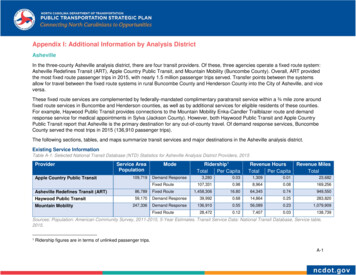


![Mecklenburg College Annual Catalogue [1963-1964]](/img/32/mecklenburgcolle159carv.jpg)
